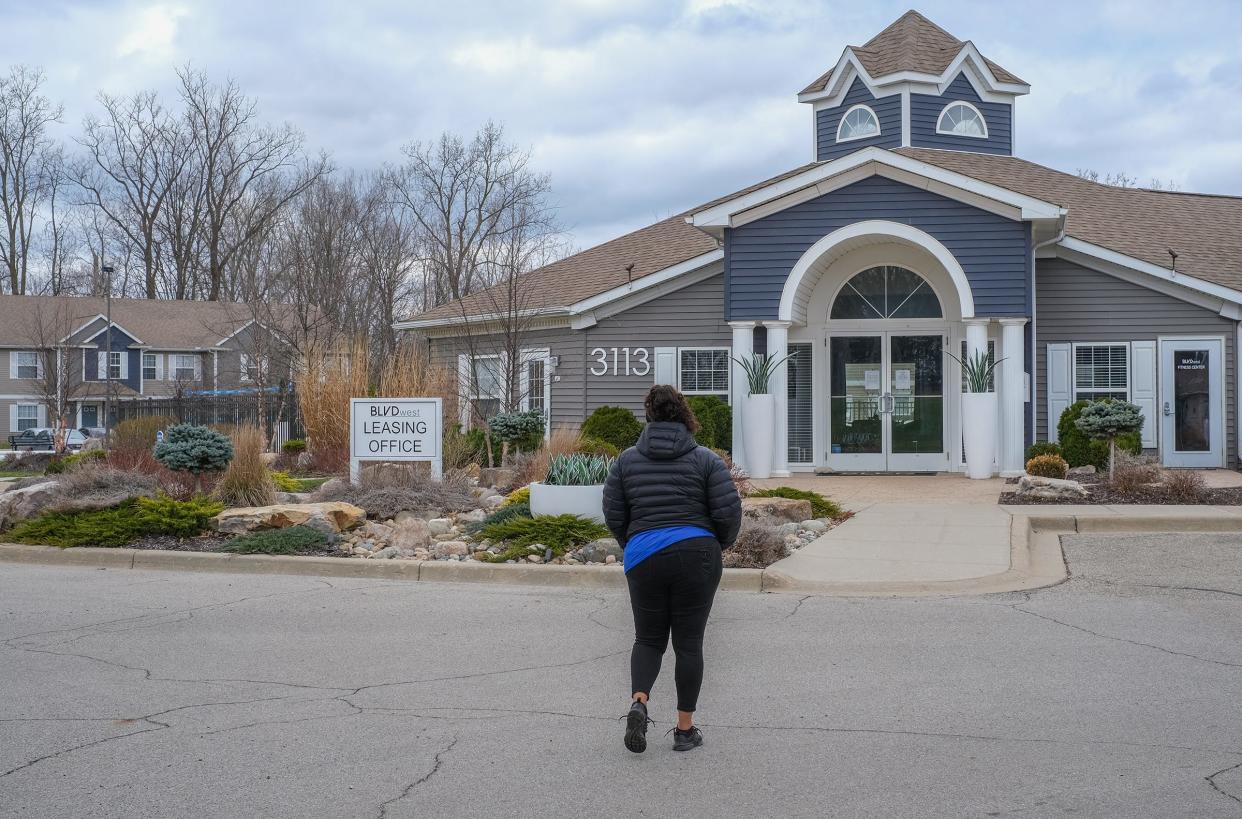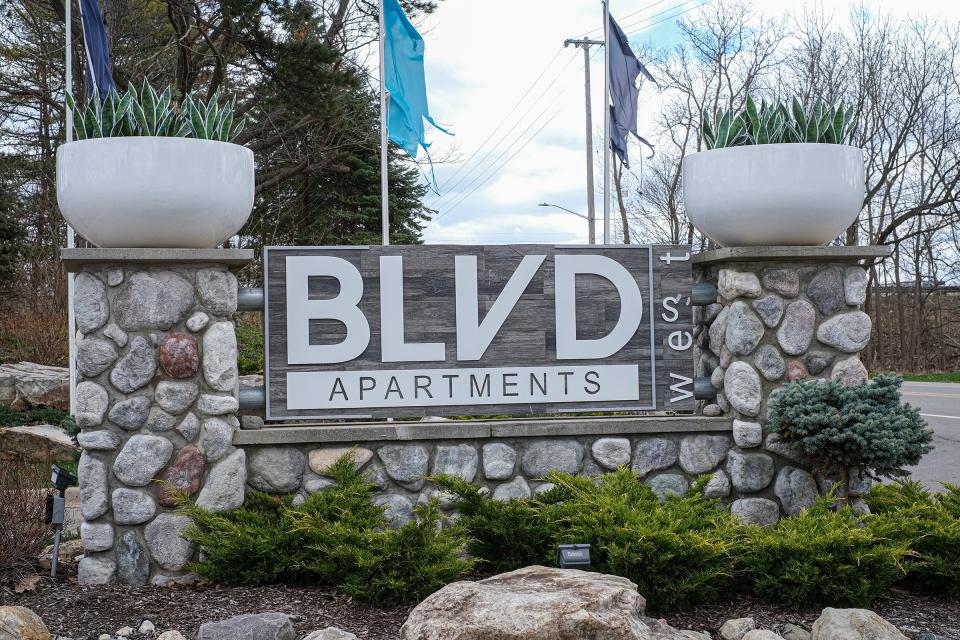Where will they go?: Women say affordable housing is difficult to find after evictions

LANSING — The eviction notices for some residents of a local apartment complex started arriving early last summer, just as the federal government’s moratorium was about to expire.
But neither Carmelleta Smith, Rosalind Johnson nor Tenille Buckner had ever fallen behind on rent, even as rates consistently rose in recent years at BLVD West — a south Lansing apartment complex across the street from the new McLaren Greater Lansing hospital.
Instead, apartment complex staff told them they no longer accepted housing vouchers for very low-income tenants, often called Section 8 vouchers. It's unclear how many residents of the complex were using the rental assistance vouchers.
BLVD West staff did not respond to a request for comment Tuesday.
The eviction notices have left the three women with few options: fighting their cases in eviction court or trying to find affordable housing that fits their needs elsewhere — which offers limited choices.
“It’s stressful,” said Smith, 42, who’s lived with her four children in a three-bedroom, two-bathroom unit since 2018. “My children … they’re worried about where we’re gonna go. They like where we live at because it’s quiet and away from everybody.”
Since receiving eviction notes, Johnson initially fought the case, but later moved out. Smith won an initial challenge, but faces another, while Buckner negotiated with the court to move out by the summer.
The families' housing instability is happening as the guardrails protecting renters throughout the COVID-19 pandemic are disappearing, making some lower-income tenants more vulnerable. A federal eviction moratorium for nonpayment of rent and related fees ended for good in August 2021. Michigan's COVID Emergency Rental Assistance program, or CERA, will stop taking new applications "at some point in the next few months," according to a statement on the program's website.
Private landlords ending participation in the Housing Choice Voucher program isn’t a new phenomenon, said Jim Schaafsma, housing attorney for the Michigan Poverty Law Program. However, he added that rejections have been more common lately, especially since the start of the pandemic.
“For many years, families with Section 8 Housing Choice Vouchers have been challenged to rent up rental units with those vouchers, but the situation has only gotten more severe and problematic for them over the course of the pandemic, and certainly since we’ve seen the inflationary effects in the economy, which have really had a significant impact on rent levels, too,” Schaafsma said.
Section 8 renters lack legal protections
Section 8 is a federal housing assistance program, administered locally by public housing authorities. It helps very low-income families in one of two ways — either by offering government-funded, “project-based” housing developments or vouchers. In Greater Lansing, the program runs primarily through the Lansing Housing Commission.
According to the U.S. Department of Housing and Urban Development, at least 75% of voucher recipients must make at or below 30% of the area’s median income. According to 2020 Census data, that's about $13,270 in Lansing.
The Lansing Housing Commission currently provides 1,785 vouchers across multiple programs, according to data provided to the State Journal. Of the vouchers provided, 86% are administered through the Housing Choice Voucher Program — with 93% of their recipients living in the city of Lansing.
During the commission's Section 8 application period — which was open for seven days in October — it received applications from about 3,300 people.
Of the most recent 350 applications processed by the commission, 22% of applicants received vouchers.
“40% of individuals did not respond, 7% were denied for various program reasons, and LHC is currently (reviewing) 31% of those applications which had a deadline response date of late March,” Director of Housing Programs Kim Shirey said in an email.
Even if people obtain vouchers, there is nothing to prevent landlords from quitting accepting the subsidy, Executive Director Doug Fleming said.
Fleming said that when he speaks with landlords who stopped taking vouchers, the most common reason given is the ability to make higher profits from market-rate rent. He said other reasons included personal biases against Section 8 recipients and increased governmental paperwork.
“That ‘Hey, if I can make more money than that, I’m not going to take $895 for a one-bedroom when I can get $1,100 from a market rent,’” Fleming said of landlords’ sentiments. “That becomes problematic to start with.”
BLVD West advertises three-bedroom units on its website starting at $1,605 per month and four-bedroom units at $1,880.
Smith said she was paying about $1,535 for her three-bedroom unit, with the voucher covering about $350. When she first arrived in 2018, the rent was $1,000.

Mulling the options
Smith, Johnson and Buckner all said finding available housing elsewhere that fits their needs has been difficult.
The housing commission refers tenants to a website — www.affordablehousing.com — to rent voucher-eligible units, which may include multifamily residential complexes or single-family homes. As of Monday, there were 17 Lansing properties with available, affordable units listed online — 10 one-bedroom apartments, six two-bedroom units, one three-bedroom unit and one four-bedroom unit.
The commission also provided an additional spreadsheet of 23 units available in April, with one overlapping unit between the two resources. The spreadsheet included six one-bedroom units, 10 two-bedroom units, six three-bedroom apartments and one four-bedroom unit.
Smith and Buckner, both mothers of teenagers, are looking for three-bedroom apartments in "safe" areas. They said options in Lansing that fit the size of their families are few and far between.
“There’s a few spots that I don’t want to go to because (of) the crime in that area … I’m not gonna go that way,” Buckner said. “I don’t want to make it seem like I’m being picky or anything, but really, I will be due to circumstances and situations. And I don’t want my kids having to go through the same thing.”
Johnson, 59, who is Carmelleta Smith’s mother, was living alone for the first time in her life prior to being evicted. She's been living with a friend ever since.
Johnson said she’s found some available one-bedroom units, but they’re far away from her workplace and at complexes with “a lot of riffraff.”
The voucher program, created by the U.S. Congress in 1974, is intended to assist lower-income renters in having greater flexibility in their living options, Schaafsma said.
“It was intended to enhance the mobility of tenants with these vouchers to be able to rent where they want to rent. If they want to rent in lower-income, higher-poverty areas — where their social support systems are, where they’ve grown up — fine, that’s their choice,” Schaafsma said. “But if they want to rent in lower-poverty, so-called high-opportunity or resource-rich areas, they’ll have the opportunity to do that. But they really don’t.”
Rising rents: Rents are spiking in downtown Lansing. Will tenants stick around?
More: Mid-Michigan is in an affordable housing crisis, doing nothing is not an option
When markets limit options, Schaafsma said, the Section 8 program can reflect longstanding characteristics of Michigan’s housing market, such as segregation by race and income.
“These (characteristics) keep everyone in Michigan … in that context. And the housing choice voucher program exists in that context and hasn’t escaped it,” Schaafsma said. “So, where people rent with their vouchers reflects those longstanding, highly segregated patterns.”
Navigating the eviction process
Fleming said the issue underscores a need for more affordable housing across Lansing.
“If I have a Section 8 voucher and I can’t find any place to go, and (have) to fall back to a project-based voucher, I, at least, have housing,” Fleming said. “(But) if we build more affordable housing with either project-based housing or as willing to accept Section 8 housing, the city’s going to be better off.”
The only realistic recourse for tenants such as Smith, Johnson and Buckner, to retain their home is eviction court, Schaafsma said. But in order to stay, they must either prove their landlord evicted them in a retaliatory manner or in a way that violates fair housing law — including protections for people on the basis of race, ethnicity, gender, ability and several other protected categories.
All three women who received eviction notices from BLVD West are Black.
Johnson went to her initial eviction court date, but opted not to continue fighting. She regrets that decision now, but said she wasn't sure how to navigate the process at the time.
“I probably should have just stayed like Carmelleta did. And by me not having any knowledge about the system as far as living places, because I’ve never actually lived by myself on my own. For 47 years, I had a mate,” Johnson said. “I didn’t know what to do.”
Buckner pursued the retaliatory defense. She had been staying in a hotel before receiving her eviction notice, after a fire forced her to move out. After months of court proceedings, she negotiated an agreement giving her until June 15 to move.
Smith also pursued the retaliatory defense. In February 2021, she broke her knee slipping on an icy sidewalk after filing a claim with the complex’s property manager asking them to put salt down.
More than a year later, a judge gave her the right to retain the property and remain at BLVD West.
But a few days later, Smith said she found another eviction notice in her mailbox, restarting the court process.
"They weren't satisfied with the answer that the judge gave them, so they went back to court," she said.
Contact reporter Jared Weber at 517-582-3937 or jtweber@lsj.com.
This article originally appeared on Lansing State Journal: Evicted south Lansing Section 8 recipients have limited options

